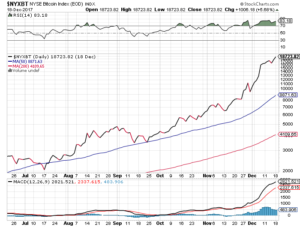This post is my take on Cryptocurrencies – Bitcoin, Ethereum, Litecoin, and the like. I am not invested in any of them but I have read a lot about them.

According to Coinbase (an exchange where one can purchase cryptocurrencies), Bitcoin is up 2,191% this year (as I write this in late December), and Ethereum is up 10, 744% this year (although Ethereum started at $8, hence the bit percentage move).



Get it? I think it’s clever.
My Takes:
- Cryptocurrency is not acting like currency at all. Currency is ideally supposed to be a safe storage of value. Its value is supposed to be relatively stable. Cryptocurrency has been anything but. The value of a currency is not supposed to change in the thousands of percent in a year.
- Currency is also supposed to be an exchange of value. You go to the store and buy a book priced at $10 and you give the cashier a $10. Case closed. What if you had used bitcoin to purchase something, say an automobile, on January 1, 2017? You would have paid at the equivalent of $800 per bitcoin. Say the car cost $30,000 at the time. At $800 per bitcoin, you would have paid 37.5 bitcoin for the car. That 37.5 bitcoin then would be worth about $687,375 today as I write this. You would feel pretty foolish had you bought that $30,000 car with bitcoin a year ago. Better yet, what if you had used your bitcoin to purchase your illegal drugs through the Dark Web? They would have turned out to be extremely expensive drugs. The benefits better have been worth it.
- Bitcoin is not easy to use to pay for things. It is not instantaneous, like the exchange of US currency, or even using a credit card. Transactions using bitcoin are proposed, reviewed and approved by the bitcoin community. This process can take a fair amount of time. There are rumors out there that Amazon and other online retailers will accept bitcoin. I don’t see this happening anytime soon because it takes too long to authenticate a bitcoin transaction.
- The blockchain technology behind bitcoin may prove more useful than the actual bitcoin. The purpose of blockchain is to identify an item using a unique, verifiable string of code. Blockchain can ultimately be used to identify anything. Simply embed blockchain code into a t-shirt and you can identify it.
- The rise in the value of cryptocurrencies reveals a high level of distrust in governments, central banks, and their currencies, throughout the world. Most currencies worldwide are backed by the full faith and credit of the governments that issue them. Let’s just say that cryptocurrency investors are skeptical of that stated full faith and credit.
- One attractive feature of bitcoin is that there will be only 21 million of them. Unlike central banks that can just print more and more currency, the number of bitcoin is capped by the blockchain code.
- There is fewer than 21 million bitcoin today. New bitcoin is being “mined” constantly by mega-large computer systems that use a lot of electricity. “Mining” means these computer systems crunch quintillions of blockchain equations in order to authenticate new bitcoin. Once authenticated, the new bitcoin is offered for sale to investors through initial coin offerings, or ICO’s. Bitcoin mining is supposed to end in 2040 when 21 million bitcoin will have been mined.
- Ethereum, having been introduced later than bitcoin, is more sophisticated than bitcoin and likely will have more practical applications. Ethereum is also based on blockchain technology but has a more modern programming language than does bitcoin. Ethereum transactions are confirmed more quickly than are bitcoin transactions, which could mean ethereum may be more useful as a retain currency in the long run.
- There are a lot of other cryptocurrencies out there trying to gain traction. It is highly unlikely that any of them will make it. Be very skeptical if you see a new cryptocurrency out there being touted as the “next bitcoin.” Don’t drop your ten-foot pole.
- I don’t have a basis upon which to invest in them now, other than just pure speculation, which I don’t do. Bitcoin futures are being introduced on the CME and the CBOE, so as they become in play perhaps I can develop some rationale to invest in them. I certainly would not short them now unless you are prepared for a lot of pain.
- Cryptocurrencies have been in the headlines lately, and that won’t change. Let’s all keep an eye on this new asset class and see how it plays itself out.
